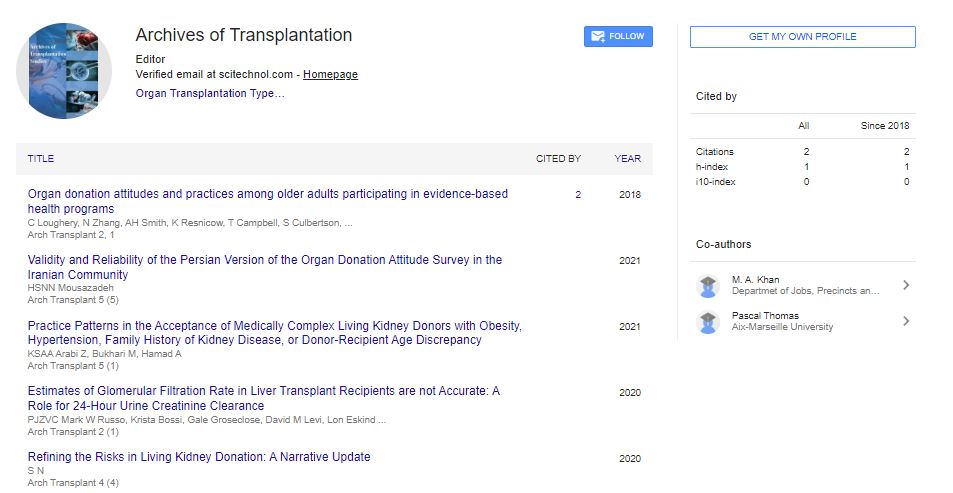Short Communication, Arch Transplant Vol: 7 Issue: 1
Transplant Infections: Causes, Symptoms, and Treatment
Jianwei Wang*
Department of Biotechnology, Dilla University, Dilla, Ethiopia
*Corresponding Author: Jianwei Wang
Department of Biotechnology, Dilla University, Dilla, Ethiopia
E-mail: wang68@gmail.com
Received date: 18 February, 2023, Manuscript No. AT-23-96353;
Editor assigned date: 20 February, 2023, PreQC No. AT-23-96353 (PQ);
Reviewed date: 06 March, 2023, QC No. AT-23-96353;
Revised date: 13 March, 2023, Manuscript No. AT-23-96353 (R);
Published date: 20 March, 2023, DOI: 10.4172/AT.1000134
Citation: Wang J (2023) Transplant Infections: Causes, Symptoms, and Treatment. Arch Transplant 7:1.
Description
Transplant surgery is a medical procedure that involves replacing a damaged or failing organ with a healthy one from a donor. While transplant surgery has significantly improved the quality of life for many patients, it also carries a risk of infections. Infections after transplant surgery can be serious and sometimes life-threatening. This article will discuss the causes, symptoms, and treatment of transplant infections [1,2].
Causes of transplant infections
The risk of infections after transplant surgery is high due to the immunosuppressive drugs given to prevent the recipient's immune system from attacking the new organ. These drugs weaken the immune system, making it easier for bacteria, viruses, and fungi to cause infections [3,4].
The source of infection can be the donor organ, the recipient's own body, or from the environment. Donor-derived infections can occur when the donor has an infection that is not detected during the screening process. Recipient-derived infections can occur when the recipient has an infection before or after the transplant surgery. Environmental infections can occur due to exposure to bacteria, viruses, and fungi in the hospital or community.
Symptoms of transplant infections
The symptoms of transplant infections depend on the type of infection and the affected organ. Common symptoms include fever, chills, fatigue, loss of appetite, and body aches. Infections of the urinary tract can cause pain during urination, frequent urination, and cloudy or bloody urine. Infections of the lungs can cause coughing, shortness of breath, and chest pain. Infections of the skin can cause redness, swelling, and tenderness. Infections of the surgical site can cause drainage, swelling, and redness [5,6].
Treatment of transplant infections
The treatment of transplant infections depends on the type of infection and the severity of the symptoms. Antibiotics are used to treat bacterial infections, while antiviral medications are used to treat viral infections. Antifungal medications are used to treat fungal infections. In severe cases, hospitalization may be required to provide intravenous medications and supportive care [7-10].
Prevention of transplant infections
Preventing infections after transplant surgery is crucial to ensure the success of the transplant and the well-being of the recipient. Steps that can be taken to prevent infections include:
- Careful screening of donors and recipients for infections before transplant surgery.
- Proper hygiene, including hand washing, wearing gloves, and using disinfectants.
- Avoiding exposure to sick people and crowded areas.
- Monitoring for signs and symptoms of infection after transplant surgery.
- Prompt treatment of any infections that occur.
Conclusion
Transplant infections can be a serious complication after transplant surgery, but they can be prevented and treated with early detection and appropriate treatment. Donor and recipient screening, proper hygiene, and monitoring for signs and symptoms of infection are essential to prevent infections after transplant surgery.
References
- Patel R, Paya CV (1997) Infections in solid-organ transplant recipients. Clin Microbiol Rev 10(1): 86-124.
[Crossref][GoogleScholar][Pubmed] - Wilson JP, TURNER HR, Kirchner KA, Chapman SW (1989) Nocardial infections in renal transplant recipients. Med 68(1): 38-57.
[Crossref][GoogleScholar][Pubmed] - Mavor AL, Thewes S, Hube B (2005) Systemic fungal infections caused by Candida species: Epidemiology, infection process and virulence attributes. Curr Drug Targets 6(8): 863-874.
[Crossref][GoogleScholar][Pubmed] - Brandt ME, Warnock DW (2003) Epidemiology, clinical manifestations, and therapy of infections caused by dematiaceous fungi. J Chemother 15(2): 36-47.
[Crossref][GoogleScholar][Pubmed] - Murakami M, Okamura K, Hayashi M, Minoh S, Morishige I, et al. (2006) Fournier's gangrene treated by simultaneously using colostomy and open drainage. J Infect 53(1): 15-18.
[Crossref][GoogleScholar][Pubmed] - Blaivas M, Adhikari S (2011) Unexpected findings on pointâ?ofâ?care superficial ultrasound imaging before incision and drainage. J Ultrasound Med 30(10): 1425-1430.
[Crossref][GoogleScholar][Pubmed] - Brooks GA, Landrum MB, Kapadia NS, Liu PH, Wolf R, et al. (2022) Impact of the oncology care model on use of supportive care medications during cancer treatment. J Clin Oncol 40(16): 1763-1771.
[Crossref][GoogleScholar][Pubmed] - Awunti M, Remer DL, Rogers S, Scarton L, Adkins L, et al. (2022) A scoping review on the relationship between race/ethnicity and the receipt of supportive care medications during cancer treatment: Implications for the clinical pharmacist. J Am Coll Clin Pharm 5(12): 1284-1296.
[Crossref][GoogleScholar][Pubmed] - Snowden JA, Ahmedzai SH, Ashcroft J, Littlewood T, Low E, et al. (2011) Guidelines for supportive care in multiple myeloma 2011. Br J haematol 154(1): 76-103.
[Crossref][GoogleScholar][Pubmed] - Zuckerman IH, Davidoff AJ, Erten MZ, Stuart B, Shaffer T (2014) Use of and spending on supportive care medications among medicare beneficiaries with cancer. Suppot Care Cancer 22(8): 2185-2195.
[Crossref][GoogleScholar][Pubmed]
 Spanish
Spanish  Chinese
Chinese  Russian
Russian  German
German  French
French  Japanese
Japanese  Portuguese
Portuguese  Hindi
Hindi 